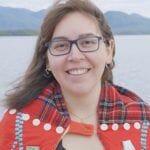The Shearwater acquisition includes a 63-acre resort and marina, as well as a marine workshop, restaurants, laundromat, sea taxi service, and more. With Heiltsuk Tribal Council’s purchase, the community regains ownership of a valued part of Haíɫzaqv territory, while expanding the business to include eco-cultural tours, employ Haíɫzaqv people, and deliver on-site training.
A Generational Investment: Haíɫzaqv Acquire Shearwater Resort and Marina
Estimated Reading time

20 Mins
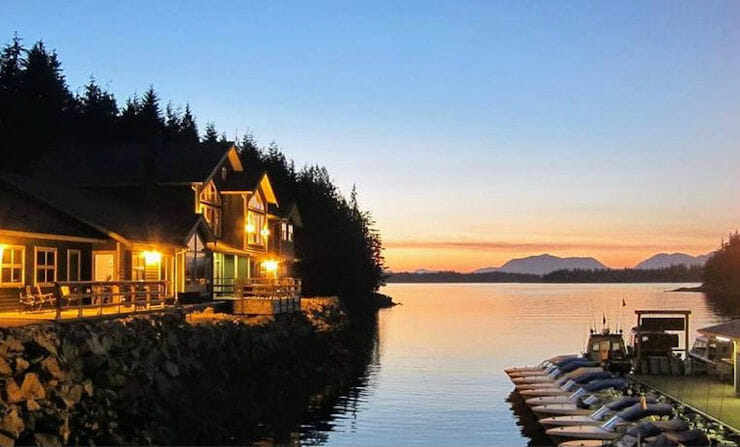
Shearwater Resort & Marina is located on Denny Island, in Haíɫzaqv (Heiltsuk) territory and across the water from Wáglísla (Bella Bella), the largest community of Haíɫzaqv people.
At a Glance
In 2021, the Heiltsuk Tribal Council invested funds secured through reconciliation agreements to acquire Shearwater Marine Ltd., a 63-acre resort, marina, and related businesses co-located on Denny Island, across the water from the Haíɫzaqv community of Wáglísla Bella Bella, on Campbell Island. Through the purchase, the Haíɫzaqv have regained ownership of an important part of their territory and are unlocking new economic opportunities for their members.
Since the 1960s, Shearwater has been a place for travellers to dock and refuel their boats, enjoy a meal, and stay overnight while exploring the central coast. Under Haíɫzaqv ownership, the resort will offer eco-cultural tours, giving guests an opportunity to view wildlife, learn about Haíɫzaqv history and culture, and grow their understanding of the relationship Haíɫzaqv people have with the lands and waters in their territory.
Through the acquisition, the Heiltsuk Tribal Council is creating employment opportunities for Haíɫzaqv members and partnering with educational institutions to offer training and certification programs at the resort.
Five Kilometres Apart
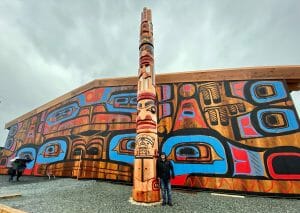
The Haíɫzaqv have lived on the central coast since time immemorial, with their traditional territory spanning more than 35,000 square kilometres of inlets, islands, rivers, and mountains.
Prior to contact with Europeans, Haíɫzaqv people lived in more than 50 village sites, including on Campbell and Denny Islands, and families would manage traplines, harvest and process salmon, and trade goods with other villages.
Colonization interrupted their way of life, bringing new diseases and cultural and economic pressures. In the winter of 1862-3, a smallpox outbreak devastated the Haíɫzaqv population, wiping out entire villages. As a result, survivors came together at Wáglísla, a site on Campbell Island, in the centre of Haíɫzaqv territory and a short distance from the Hudson’s Bay Company trading post at McLoughlin Bay. (Today, Wáglísla, which means “river on the beach”, is also called Bella Bella, and is the main reserve community for the Haíɫzaqv.)
Just five kilometres across the water, another community in Haíɫzaqv territory, Denny Island supported family villages for millennia.
“[Denny Island has] always been a place where there’s been lots happening,” says Yáláƛí Megan Humchitt, Chairperson of Shearwater Resort. Humchitt, who grew up in Wáglísla Bella Bella, is the daughter of Haíɫzaqv Yím̓ás (Hereditary Chief) Wigvilhba Wakas Harvey Humchitt Senior and shares her knowledge as a guide for visitors to Haíɫzaqv territory.
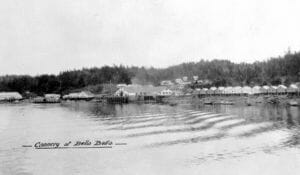
In the 1920s and 1930s, Denny Island was home to two canneries that processed clams, abalone, and salmon, she says. “People came from community and other places all over to work in the two canneries” and a small town with a store and post office grew to support workers. The business model shifted over time, as cannery operations consolidated in other production centres. By 1938, the Denny Island cannery buildings were dismantled and moved to the Pacofi Cannery complex on Moresby Island in Haida Gwaii.
Shortly after, the Canadian government used the land to construct an airstrip on Klik-Tso-Atli Harbour, a strategic location on Canada’s Pacific coast, which became known as Shearwater. During the Second World War, the airstrip grew into a full-sized Royal Canadian Air Force station, with aircraft hangars, a hospital, administration buildings, and accommodation for up to 1,000 people, including Haíɫzaqv members who served in the war. Near the end of the war, the air force closed the station, moving troops and aircraft to the Comox base.
Post-war, Andrew Widsten, a former RCAF officer from a Norwegian family, purchased the Shearwater property from the Canadian government and developed a marine service business and resort. Through the 1960s onwards, the Widsten family grew the business, adding a restaurant, conference centre, laundromat, sport fishing tours, and other services to attract visitors from Europe and North America.
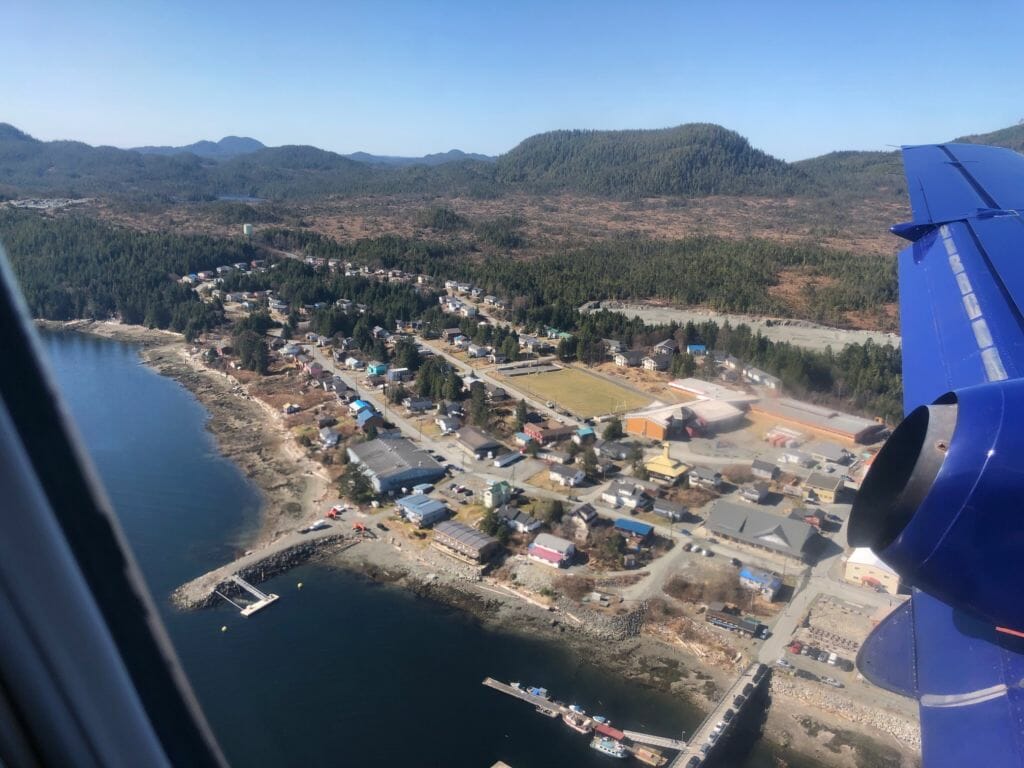
For tourists, Shearwater became known as a fly-in destination for sport fishing and a place for boat travellers to rest and refuel on their journeys up and down the central coast. Yet, despite Shearwater’s proximity to Wáglísla Bella Bella, there was sometimes a “gap between the communities,” says Evangeline Clifton, a councillor on the Heiltsuk Tribal Council.
[Denny Island has] always been a place where there’s been lots happening.
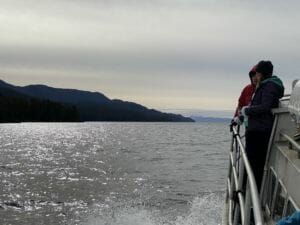
The resort, which had been designed to attract and cater to wealthy tourists, was also an important place for locals, providing restaurant meals and marina services for people from Denny Island and Wáglísla Bella Bella.
When Craig Widsten, son of the original owner, began planning his retirement, the Heiltsuk Tribal Council saw an opportunity to chart a new path, bringing the two communities closer together and offering visitors a taste of Haíɫzaqv hospitality.
Haíɫcístut: Making it Right Again
As the director of the Heiltsuk Integrated Resource Management Department (HIRMD), Kelly Brown leads a 25-person stewardship team that’s responsible for land and marine use planning in the Nation’s territory, running fisheries and forestry programs, reviewing 20 to 30 industry referrals a month, and providing technical advice to the Heiltsuk Tribal Council. Brown also works as a negotiator, representing the Tribal Council in business acquisitions and reconciliation agreements.
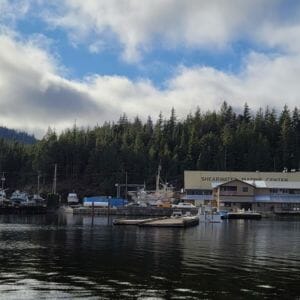
“[The Haíɫzaqv have] always been interested in buying Shearwater from the Widstens,” Brown says. Years ago, the Tribal Council reached an agreement with Craig Widsten that, when the time came to sell Shearwater, the Heiltsuk Tribal Council would have the first right of refusal to buy the property and businesses.
When Brown and other members of the Tribal Council began negotiating a reconciliation agreement with the federal government in 2017, they kept the Shearwater purchase in mind.
At the time, Brown says that 65 per cent of working-age adults in Wáglísla Bella Bella were unemployed and the Tribal Council “wanted to close that socioeconomic gap” and reduce its dependence on Crown governments. “With all the resources taken away from us under the colonial takeover, it’s been difficult for us to climb back,” he says.
In 2019, the Heiltsuk Tribal Council and the Government of Canada signed the Haíɫcístut Incremental House Post Agreement, which included a $42.72-million investment in four house posts, or community priorities: self-government; housing and infrastructure; economic development; and language revitalization and preservation.
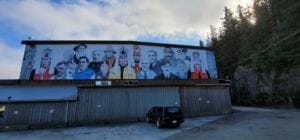
(Photo: Evangeline Clifton)
Haíɫcístut is a Haíɫzaqvḷa potlatch term that means to “turn things around and make things right again.”
“In that agreement, we identified Shearwater as something that we would purchase,” says Brown. “At that time, we set aside $7 million to purchase the property and all the businesses.”
In 2019, when Craig Widsten was getting ready to sell Shearwater, the Haíɫzaqv had money set aside and were beginning negotiations on a reconciliation agreement with the Province of British Columbia, which would invest another $22.33 million in the community’s priorities, including the Shearwater purchase.
After several rounds of negotiations, the Heiltsuk Tribal Council reached an agreement to purchase the Shearwater Resort and Marina, including 63 acres of land and associated businesses, for $12.7 million.
“When you think about how it was Crown land, sold to the Widsten family, and then how Heiltsuk [Tribal Council] purchased it back using Haíɫcístut funds, it really is a full circle story,” says Humchitt.
We’ve always talked about purchasing Shearwater and so, to have that deal closed and to have that paper signed and to have our land back, it’s really quite indescribable.
The purchase agreement was signed on June 30, 2021 and, on the following day, the Tribal Council celebrated “Heiltsuk Day” with a ribbon-cutting, cultural ceremonies and dances, speeches from hereditary and elected leaders, and a flag-raising ceremony at the resort.
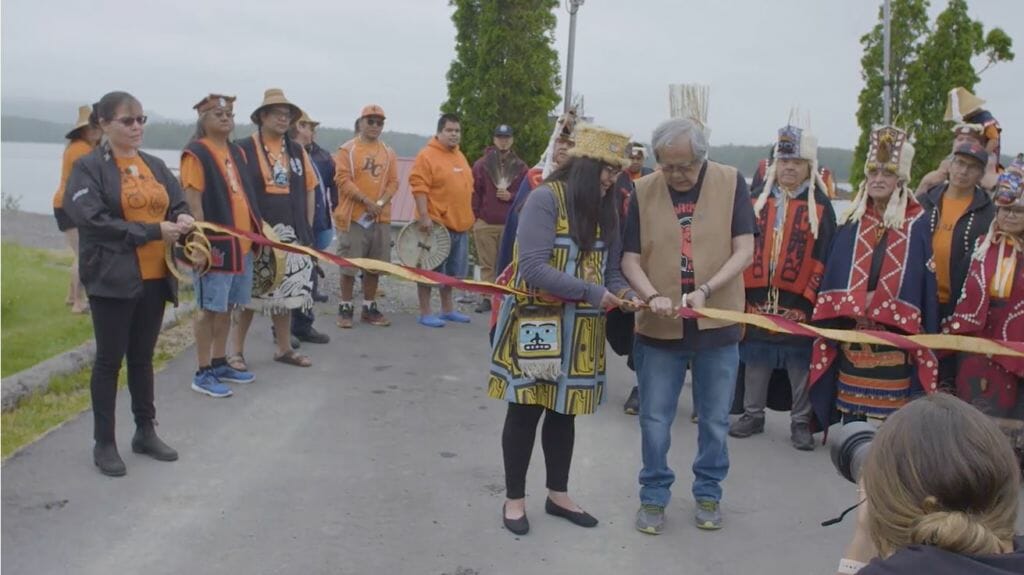
“It’s an amazing day to be Haíɫzaqv,” said K̓áwáziɫ Marilyn Slett, elected Chief Councillor, Heiltsuk Tribal Council, in a speech at the celebration. “[This purchase] signifies land back to our community, providing an economy to our people, jurisdiction over the lands, it’s amazing.”
“It was an incredible feeling to have that change-over and signing happen on July 1,” says Humchitt. “We’ve always talked about purchasing Shearwater and so, to have that deal closed and to have that paper signed and to have our land back, it’s really quite indescribable.”
Through the Haíɫcístut reconciliation process, the Haíɫzaqv are demonstrating the power of foresight and community planning, which have contributed to their success in negotiating with Crown governments. With the financing they’ve secured for their house post priorities, including the Shearwater acquisition, the Haíɫzaqv have the resources and community backing needed to chart a new path forward.
Opportunity Through Eco-Cultural Tourism
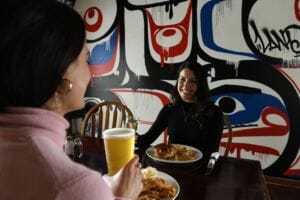
With the purchase finalized, the Heiltsuk Tribal Council is adapting Shearwater’s business model, incorporating Haíɫzaqv traditions, stewardship values, and hospitality.
Jaimie Teagle, a Haíɫzaqv member, was recently hired as the Chief Operations Officer at Shearwater and is building on the work begun by Clifton, a council member who served as COO for the first year following the acquisition.
Drawing on her experience in business management and the support of her community, Teagle is working to create a new kind of tourism experience at Shearwater – one that highlights the strength of the Haíɫzaqv people and their intricate relationships with the lands, waters, and wildlife in their territory.
Through the summer and fall of 2022, Teagle and her team are working to launch new eco-cultural tourism packages, replacing the sport fishing offerings Shearwater was once known for, and attracting visitors who want a more authentic experience of the coast. In the short term, changing the way the resort conducts fishing is needed, as the community works to build a tourism model that can sustain the Haíɫzaqv way of life, and the ecosystems the community relies on.
We want to have visitors come to see us, be curious, have open minds, and talk to us about who we are as Haíɫzaqv.
“We’re sharing our story and welcoming visitors to our beautiful home on the central coast,” says Teagle. “And while they’re here, we’re making sure that every guest enjoys a good Haíɫzaqv hospitality experience.”
Through their eco-cultural tour packages, Shearwater guides will bring guests out on the water to view wildlife in a respectful way, and onto the land to learn about Haíɫzaqv history, hear from local storytellers, and see petroglyphs and pictographs in culturally-safe areas.
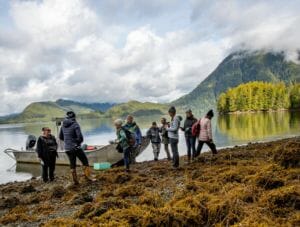
“[Clients are] interested in seeing whales, sea lions, killer whales, grizzly bears, and learning about the local areas,” says Brown. “There’s a lot of interest already [and we’re] making sure we find the people interested in that and making sure they come to us.”
Teagle and her team are working with BC Ferries, Indigenous Tourism BC, and other tourism agencies to attract visitors from British Columbia and Washington state, as well as travellers from further afield in North America and Europe.
“We want to have visitors come to see us, be curious, have open minds, and talk to us about who we are as Haíɫzaqv,” says Humchitt. “This place offers a connection that’s rooted in Haíɫzaqv [people and culture], and in the lands, waters, and animals in this territory.”
Prior to the COVID-19 pandemic, Indigenous tourism was the fastest-growing sector of the tourism industry, generating $705 million a year and employing more than 7,400 people, according to Indigenous Tourism BC.
With travellers eager to explore after two years of lockdowns and travel restrictions, Teagle has assembled a team to support the operation of the resort, marina, and all of the other businesses acquired through the Shearwater purchase, including an RV park and campground, fuel stations for boats and seaplanes, a shipyard and machine shop, a pub and restaurant, charter boats and water taxis, as well as a grocery store, liquor store, post office, laundromat, and hardware store. Importantly, the shops and lodgings at Shearwater are powered with renewable energy: 97 per cent of Denny Island’s electricity comes from the Ocean Falls hydropower facility.
“As we were putting the deal together, we were thinking about the number of jobs we could acquire and the training we could do to get people into positions [at Shearwater],” says Brown. Acquiring Shearwater and expanding its eco-cultural tourism programming created several job opportunities in hospitality, tourism, marine service, and in operations.
“I’m so happy with the team we have,” says Teagle. “We’re learning from long time Shearwater staff members that have seen the highs and lows that come with a tourism business, while creating opportunities for our community members to take that leap of faith and move into new roles.”
With so many Haíɫzaqv members and others coming to work on Denny Island, the Heiltsuk Tribal Council needed to increase housing options for staff. With financing through the Coast Funds economic development fund, the Tribal Council is looking into purchasing a floating accommodation barge which, once renovated, will provide safe, clean housing for staff members.
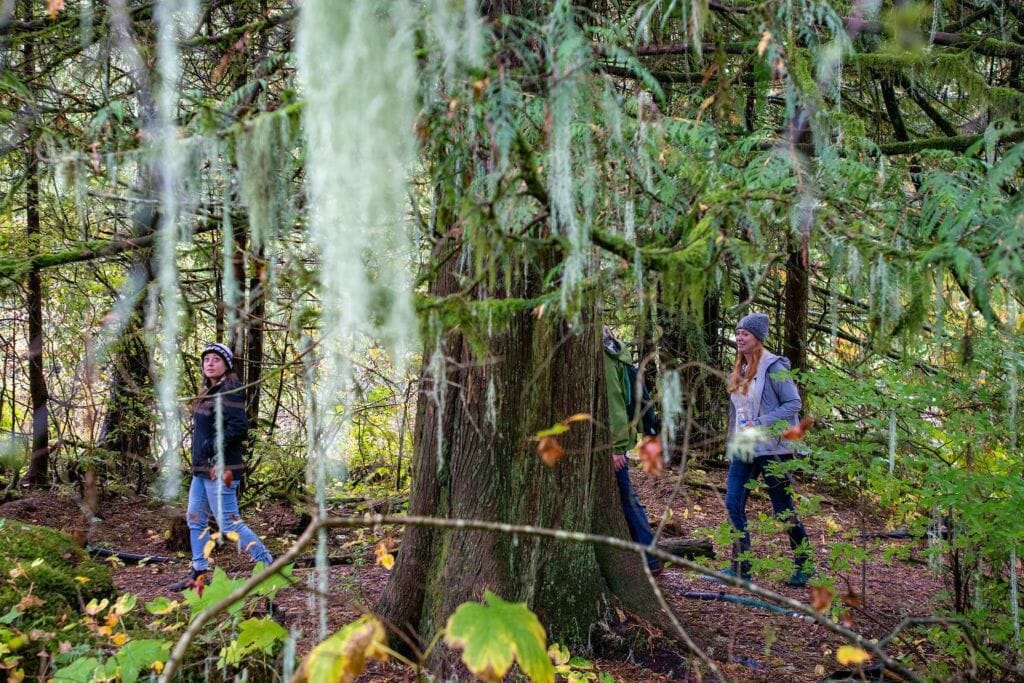
To support community members in taking on these new roles, the Tribal Council is partnering with Vancouver Community College, Quadrant Marine Institute, and the Mid Coast First Nations Training Society to offer on-site training and a $2,000 stipend for Haíɫzaqv members who want to earn trades certifications and apply their skills to a career at Shearwater.
It’s much more than buying a company…it’s employment, it’s economy, it’s tourism through a Haíɫzaqv lens.
“Even if they don’t work at Shearwater, those skills can be used anywhere in the community,” says Teagle. Marine training will help community members who want to support the Nation’s Guardians, start their own businesses, or even to maintain their family’s boats.
Through their partnership with Vancouver Community College, the Haíɫzaqv are co-creating a Haíɫzaqv Culinary Arts course to share knowledge on gathering, harvesting, and traditional food preparation. It’s one example of how the programs are “community-led and community-based,” says Humchitt. Another benefit? By offering training at Shearwater, “members don’t have to leave [the territory] and can be home at night.”
Through these opportunities and partnerships, Humchitt says the Heiltsuk Tribal Council is helping to close the socio-economic gap in a safe way that welcomes community members, honours Haíɫzaqv traditions, and builds capacity for the community to succeed as a whole.
“Our community is super excited about this acquisition,” said Chief Councillor Slett at the celebration for the acquisition. “It’s much more than buying a company…it’s employment, it’s economy, it’s tourism through a Haíɫzaqv lens and helping to share our story.”
A Place for Community
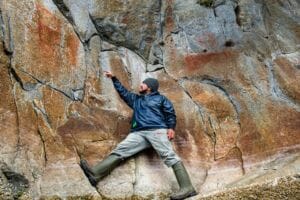
Beyond the economic opportunities, the Shearwater acquisition marks a turning point in the relationship between the Haíɫzaqv and Denny Island.
Humchitt and Teagle are working to make the resort more welcoming to community members – bringing Haíɫzaqvḷa words to menus and signage, highlighting Haíɫzaqv culture and stories in tour offerings, and revamping the menu to reflect local tastes. The approach is working well, says Teagle, who notes that the Haíɫzaqv Salmon Dinner is one of the best-selling entrees at the restaurant.
“Us locals aren’t going anywhere,” says Teagle. “We’ll always be an important part of the clientele and, with ownership, the Haíɫzaqv are transforming Shearwater into a community and economic asset.”
“It’s an opportunity for us to tell our own story about who we are to people who are travelling through our territory,” agrees Humchitt. “Getting our land back… how powerful is that? We now reclaim this space – a space that hasn’t always been friendly to Haíɫzaqv people or Indigenous people – and now, we have the opportunity to really turn it around and to focus on the things that are important to us.”
Brown, who leads the Nation’s stewardship efforts through the Heiltsuk Integrated Resource Management Department, says that access to the resort property and its charter fleet can benefit the stewardship department and set a higher bar for conduct in Haíɫzaqv territory.
Us locals aren’t going anywhere. We’ll always be an important part of the clientele and, with ownership, the Haíɫzaqv are transforming Shearwater into a community and economic asset.
“Shearwater’s going to set the standard for what’s expected from everyone else,” he says, pointing to marine use, fishing, and resource management as examples. “It’s given us a bit more to chew on from a stewardship perspective.”
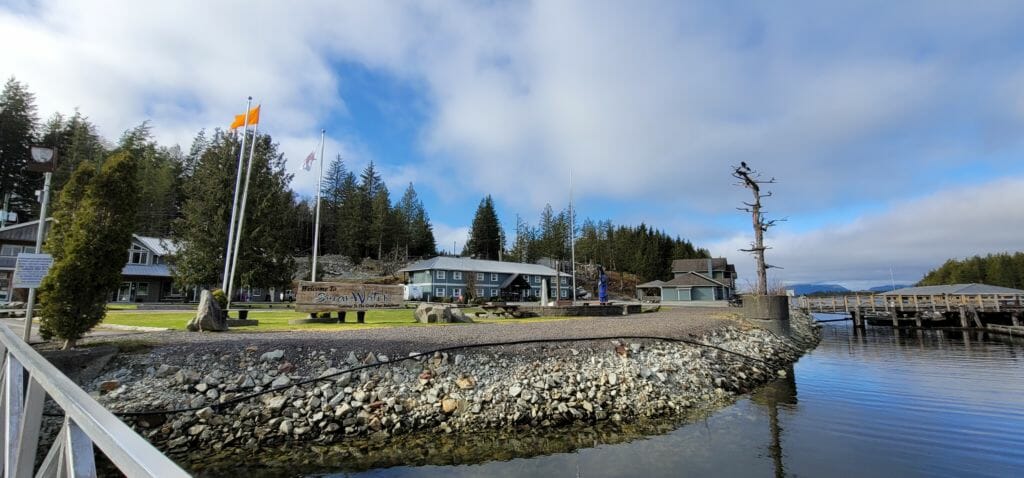
Getting our land back… how powerful is that? We now reclaim this space and have the opportunity to really turn it around and to focus on the things that are important to us.
“The foundation comes from all of the leaders and all of the ancestors and all of the people that came before us,” says Humchitt. “It’s part of who we are, as Haíɫzaqv, to work together and to work really hard to move forward and to create for our community, but also to collaborate with others in our community for the best interests of our territory and our people.”
In 2021, Coast Economic Development Society approved $450,000 towards Heiltsuk Tribal Council’s acquisition of Widsten Holdings Inc., the parent company of Shearwater Resort, and the purchase a floating barge for staff accommodations.
Partnerships
- Heiltsuk Tribal Council
- Heiltsuk Economic Development Corporation
- Heiltsuk Integrated Resource Management Department (HIRMD)
- Vancity
- Craig Widsten
- Province of British Columbia
- Government of Canada
- Coast Funds
- Vancouver Community College
- Quadrant Marine Institute
- Mid Coast First Nations Training Society
Online Resources
- Book Your Stay at Shearwater
Shearwater Booking Page - Reconciliation in Action: Heiltsuk Nation Celebrates July 1st as “Heiltsuk Day” with Purchase and Transfer of Shearwater Resort and Marina for $12.7 Million
Heiltsuk Tribal Council Media Release – Shearwater Acquisition - Canada and Heiltsuk Sign the Haíɫcístut Incremental House Post Agreement
Government of Canada Media Release - Reconciliation Agreement - Heiltsuk Nation and B.C. Sign Model Reconciliation Agreement
Province of British Columbia Media Release - Reconciliation Agreement - Heiltsuk Nation Signs Letter of Intent to Purchase Shearwater Resort & Marina from Widsten Holdings Inc.
Heiltsuk Tribal Council Media Release - Intent to Purchase
Published On August 25, 2022 | Edited On February 17, 2023

